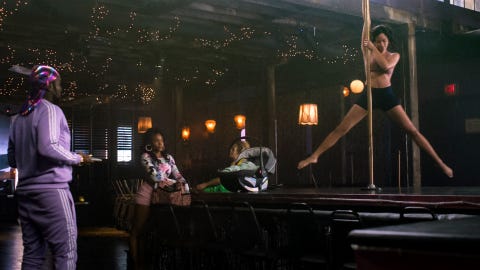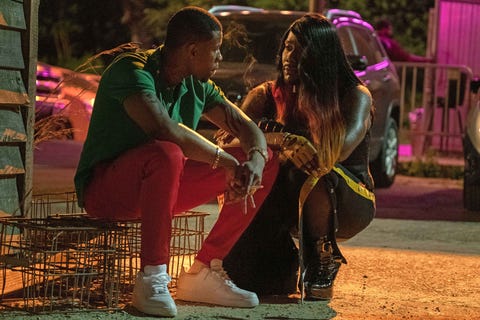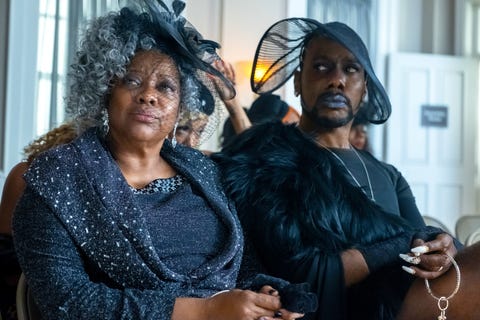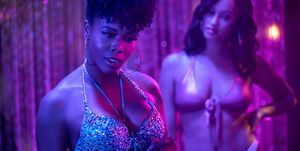If you watch P-Valley, you know the season finale ended the same way it started: an addictive, satisfying, muggy mess of a drama that left us wanting more. Based on the
play Pussy Valley by Katori Hall, who is the showrunner and executive producer of the TV series, P-Valley centers on the Pynk, a strip club nestled in a small conservative Mississippi town. It's owned by Uncle Clifford (Nicco Annan), a non-binary beauty trying to hold on to her iconic establishment as greedy developers swarm, hoping to use the land to build a multi-million dollar casino.
And then there are the dancers, the backbone of the Pynk, who are more than just ladies on a pole for male consumption. Just look at the Mercedes (Brandee Evans), a veteran dancer trying to leave the life, buy a dance studio, and get her estranged daughter back. Or the mysterious Hailey (Elarica Johnson), a newcomer hiding from her past with multiple fake identities and tons of cash. Or Keyshawn (Shannon Thornton), a young mother facing domestic violence and trying to build a better life for herself and her babies. Like exotic dancers in real life, they are unapologetic, multifaceted women who have dreams, desires andunwavering drive.
Under a different creator with a less sophisticated and limited gaze, P-Valley could've fallen flat, but through the leadership and vision of Hall, who hails from the South, that nuance and “love for Black people” ring through each episode. But most importantly, as Hall tells ELLE.com, outside of the juicy interwoven storylines and robust characters P-Valley has also helped facilitate a much-needed conversation about Black women, their bodies, and the power of sexual autonomy in America.
It's been an incredible season, seeing the response to the show and its early renewal for season 2. You must feel vindicated, because I know a series about Black exotic dancers in the South couldn't have been an easy sell.
That is exactly the word I would use: vindicated. I feel so vindicated, because when I was ready to pitch the show, I went all around town in Hollywood, and so many people wouldn't even let me in the door, like, "There are no shows about exotic dancers, and no wants this. Sorry, not sorry." Ironically, there were some Black people who told me, "Katori, you're Ivy League-educated, why not do something about lawyers or doctors? Why create something that plays into the pathology of the Black community?"

Well, you know respectability politics are real, and that's what I love about your work—it pushes against that notion of all of us having to be like the Obamas. Why does challenging your viewers like this matter?
First, I am a Black Southerner and wasn't born with a silver spoon in my mouth. Even though I went to those [universities] and understood all of these politics, my Blackness and where I was from was never far from my mind. I never felt any shame about where and how I grew up. I am proud of where I came from. My grandmother was a sharecropper, and we used to live in a very impoverished neighborhood in Memphis, and we moved out to be in a "better" neighborhood. But every summer, I went back to visit Big Momma. And I learned that no matter where I lived or where I went or if I spoke a certain way, I'm still Black. They are still gonna treat me like a nigga. So, I never felt that I had to put forward images that made people feel comfortable. And because I grew up on the fault line, I feel like it's my responsibility to shake the table. Actually, shake the ground.
And shake the ground P-Valley does.
Thank you. There is a tremendous feeling of satisfaction in seeing errbody—across the economic lines, genders, young and old—celebrating the show and seeing themselves in it. There are 70-year-old women putting their 20-year-old granddaughters onto the show, and that's a reflection of how much care we put into this story about a topic that is still kind of taboo. But we put humanity and honesty first, which is my bull's eye and responsibility as a Black female writer from the South.
"I never felt that I had to put forward images that made people feel comfortable."
You're right, stripping is still taboo, but what do you think culture-wise helped make P-Valley possible?
Cardi B literally rolled out the Pynk carpet for P Valley. I was following her on social media when she was a dancer because I loved her personality. She was funny as fuck and smart as fuck, and even being young, she was this vibrant and political woman who was articulating herself in this powerful way. So fast forward, she just popped, and this story about this stripper-turned-rapper was on everyone's tongue. She made other people feel comfortable and be more accepting—and was unapologetic about it the entire time. She was the starting point. Then, of course, Hustlers coming before us, and centering the community, through a female gaze, helped—that and it was critically and commercially successful. Maybe now, the folks that greenlight things were ready to have a conversation about sex work. I remember we were in production when the film premiered, and we all said, "Thank God!" [Laughs]

It's so funny, because strip club culture has a lot more power than people give it credit.
Exactly! Strip club culture has moved the culture. Rappers have built empires about that space. Strippers are the A&R execs of the hip hop world—if a woman doesn't want to dance to your track, it must be bad, boo-boo. Not just that, but pole dancing classes have become so mainstream. It's changed the worldwide culture. Hey, J-Lo was on the pole at the Super Bowl.
Yet, while it's shifting culture, a Black woman owning her body and her sexuality isn't always as embraced. Just look at the pushback to Cardi B and Megan Thee Stallion's "WAP." Why do you think this double standard exists for us?
It's OK for [non-Black women] to get butt injections and pump up their lips to look Black-adjacent, but when it comes to Black women with their natural Black asses and natural Black boobs, it once again brings up these complicated feelings. Historically, we know that [white] people have misused Black female bodies. During slavery, we were placed on auction blocks and sold. I think of Hottentot Venus, Sarah Baartman, who was put on display in a British museum to be gawked at. Her body made people uncomfortable, yet they couldn't stop looking. That uncomfortability still happens today, but there are women working past that. I look at Megan Thee Stallion, one of the smartest businesswomen out there…and what a body! She knows how to move the needle comfortably, being a boss.
Look, I don't see a difference between LeBron James and Megan. One is in a masculine form that plays for a team he doesn't own. Then we have this woman who is using her Black voluptuous body and getting money on her own terms. There is a commodification of the Black body happening in the spaces and in professional sports. All of these conversations center on power or lack of power, exploitation, empowerment, and talent.

Next to Niecy Nash and her new wife Jessica Betts, Uncle Clifford and Lil Murda (J. Alphonse Nicholson) are the best surprise Black queer couple of 2020. Why was this storyline so important to you this season?
We just needed to show folks like Clifford being loved on like that. Lil Murda can't control himself around the two spirits that is Uncle Clifford and is turned on by more than how beautiful and fearless Uncle Clifford is—it's truly a soul match happening in real-time. Lil Murda would take a bullet for her. He would take off his mink and put it over a puddle for this non-binary beauty. It's beautiful.
Not to mention Uncle Clifford's grandmother Ernestine (played by Loretta Devine). Despite us knowing that Black parents and grandparents have and can love their LGBTQ family members, sadly, we don't get to see that very often onscreen.
I know Ernestine is real because I've seen it. I've witnessed Black mothers and grandmothers be accepting. Yes, we hear that Black folks are just so homophobic, and there is some truth to that, but it's not the whole truth. It's complicated. And with Ernestine, you have this older Black woman who always had two fucks to give and has been radical in her love for her grandchild, and that's important to put out in the world. These stories are putting out empathy and there is power in that relationship, that kinship.

Over the past year, there has been a much-needed influx of TV shows led by Black female showrunners: Misha Green's Lovecraft Country, Michaela Cole's I May Destroy You; Felischa Marye's Bigger; and Tracy Oliver's First Wives Club. You are officially part of this sisterhood. How does it feel?
We hold each other up and down. Even when we don't know each other, we are always amplifying each other and other Black female writers; we are collectively holding hands and pulling each other up. I remember emailing Ava [DuVernay] when she was in the middle of shooting When They See Us, and she emailed me back with advice. It's great because everyone is always ready to mentor and answer a question to make sure all of us succeed. Because if one of us succeeds, great, but why can't all of us succeed? We don't want to be the first or the last; we want to be one of many.
Can you tell us anything about season 2?
We have not started, but I've started it in my mind. There are a lot of things to work out with scheduling and who can return to the writers' room and it's very complicated, but I have kept a log of all the stories I've wanted to tell and a lot of threads to pull, especially after the season finale. This is an interesting moment, what's happening in our world with the virus and the uprisings, and I am definitely thinking of how we can participate in those conversations through this art. But just know, it’s not coming any time soon. [Laughs]


